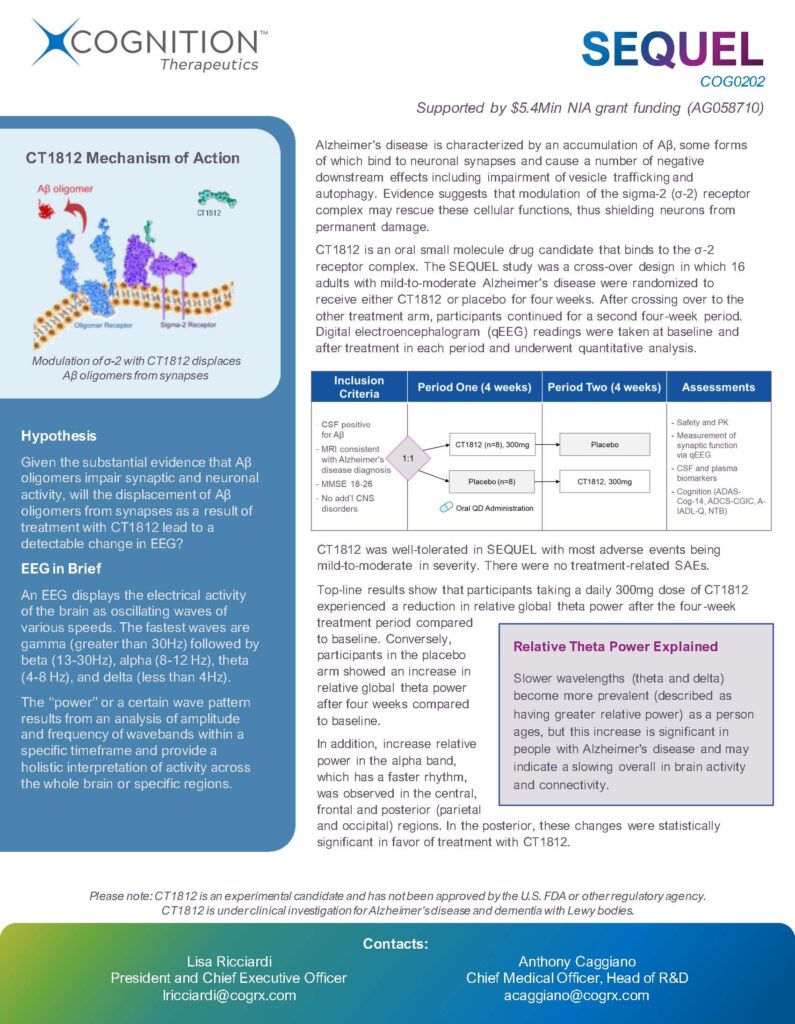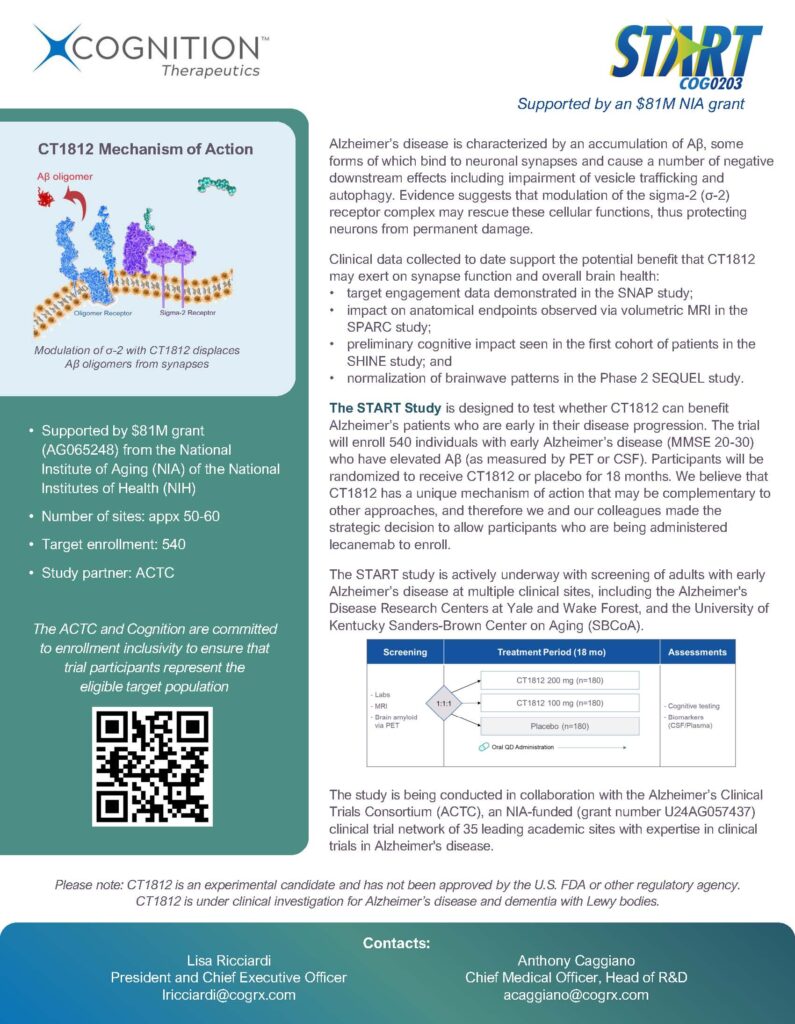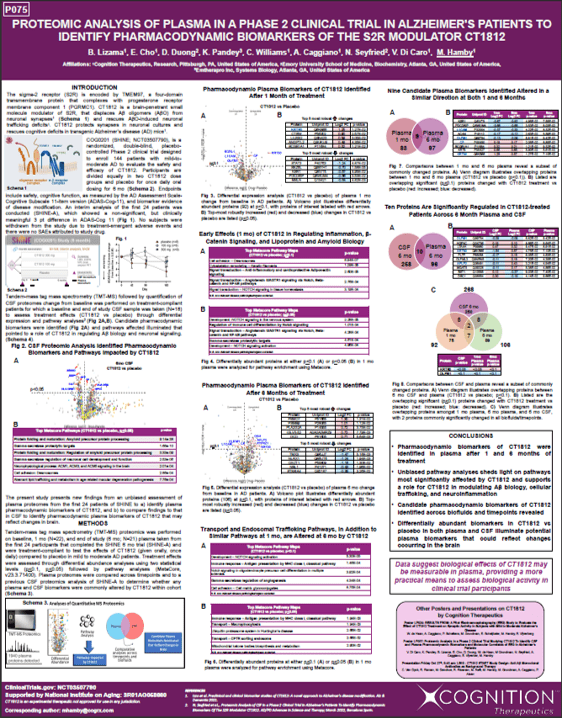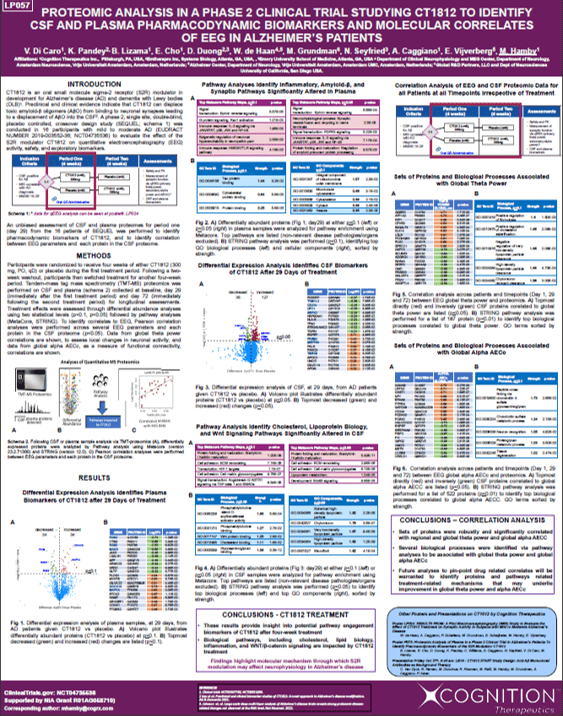CTAD 2023
Cognition Therapeutics reviewed data from several studies of CT1812, the Company's lead candidate for the treatment of adults with early, mild and moderate Alzheimer’s disease at the Clinical Trials on Alzheimer’s Disease (CTAD) conference in October 2023.
Title:
A Pilot Electroencephalography (EEG) Study to Evaluate the Effect of CT1812 Treatment on Synaptic Activity in Subjects with Mild to Moderate Alzheimer’s Disease
Poster: LP024
Authors:
De Haan W, Caggiano AO, Scheltens P, Grundman M, Scheijbeler E, Hamby ME, Vijverberg E
Title:
Proteomic Analysis of Plasma in a Phase 2 Clinical Trial in Alzheimer’s Patients to Identify Pharmacodynamic Biomarkers of the S2R Modulator CT1812
Poster: P025
Authors:
Lizama B, Cho E, Duong D, Pandey K, Williams C, Caggiano AO, Seyfried N, Di Caro V, Hamby ME
Title:
Proteomic Analysis in a Phase 2 Clinical Trial Studying CT1812 to Identify CSF and Plasma Pharmacodynamic Biomarkers and Molecular Correlates of EEG in Alzheimer’s Patients
Poster: LP057
Authors:
Di Caro V, Pandey K, Lizama B, Cho E, Duong D, De Haan W, Grundman M, Seyfried N, Caggiano AO, Vijverberg E, Hamby ME
Title:
CT1812 START Study Design: Anti-Aβ Monoclonal Antibodies as Background Therapy
Oral: LB18
Authors:
van Dyck CH, Raman R, Donohue MC, Rissman RA, Rafii MS, Hamby ME, Grundman M, Caggiano AO, Aisen PS
Oct 27, 2023
8.45 a.m. ET
8.45 a.m. ET
Resources
Learn more about EEG in this backgrounder
Learn more about the SEQUEL study and its design in this backgrounder
Learn more about the START study and its design in this backgrounder



Poster Presentations
A Pilot Electroencephalography (EEG) Study to Evaluate the Effect of CT1812 Treatment on Synaptic Activity in Subjects with Mild-to-Moderate Alzheimer’s Disease
Cognition’s Phase 2 SEQUEL study (NCT04735536) explored whether treatment for four weeks with CT1812 could impact relative theta power in 16 adults with mild-to-moderate Alzheimer’s disease. CT1812-treated participants showed consistent trends of improvement across all prespecified EEG parameters. In particular, improvements were seen in global relative theta power and in global relative alpha power, as well as in connectivity, as assessed by alpha AECc, which may indicate improved communication between different parts of the brain.
The SEQUEL study, which was conducted in the Netherlands, was supported by a grant from the National Institute on Aging (R01AG058710). Click the image to the right to review the complete poster.

Proteomic Analysis of Plasma in a Phase 2 Clinical Trial in Alzheimer’s Patients to Identify Pharmacodynamic Biomarkers of the S2R Modulator CT1812
An analysis of plasma samples from participants in the first cohort of the Phase 2 SHINE study (NCT03507790) taken after one month of treatment showed an impact on pathways consistent with the proposed mechanism of action for CT1812, including pathways associated with beta amyloid (Aβ) biology and neuronal survival. After six months of treatment, analyses pointed to an impact on pathways involved in endosomal transport, inflammation and trafficking, which is consistent with our understanding of the effect CT1812 has on disease-relevant processes after extended modulation of the sigma-2 (σ-2) receptor.
The SHINE study is currently enrolling participants at sites in the United States and Europe. It is supported by approximately $30 million in grant funding from the National Institutes on Aging (NIA). Click the image to the right to review the complete poster.
Proteomic Analysis in a Phase 2 Clinical Trial Studying CT1812 to Identify CSF and Plasma Pharmacodynamic Biomarkers and Molecular Correlates of EEG in Alzheimer’s Patients
Consistent with findings from the SHINE cohort after one month of treatment, analyses of plasma samples from SEQUEL study participants, who were also treated for one month, show significant impact on Aβ biology as well as pathways involved in neuronal function. In addition, analyses of SEQUEL proteomics identified proteins that are correlated with regional and global theta power and global alpha AECc. Cognition scientists plan to further analyze these data to identify which proteins and pathways are related to the improvements in global theta power and alpha AECc observed in CT1812-treated participants. Click the image to the right to review the complete poster.


